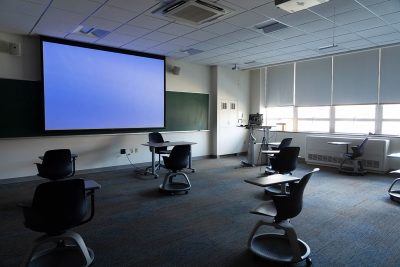
As the one year anniversary of the transition to online teaching approaches, Boston University faculty are reflecting on the mental and emotional impacts of their new teaching styles.
Paula Austin, assistant professor of history and African American Studies, said she “can’t say it’s been good.”
Austin — who did not receive a workplace adjustment this semester or last year — has been teaching in the hybrid Learn from Anywhere format and said the technical issues, along with the stress of simultaneously teaching two different classes, has been difficult.
“Every classroom that I’ve been in, there’s been some technology issue that usually gets rectified, but really not until the middle of the semester,” Austin said. “I think the cognitive load for an instructor having to manage multiple modes of learning simultaneously has been a lot.”
Along with the difficulties posed by hybrid teaching, Austin said there have been additional mental health challenges for both faculty and students in this format of education.
“I think faculty, myself included, and students are going through a lot, isolation, existential stuff, anxiety, depression,” Austin said. “Because we are in the middle of a really unprecedented historic time.”
Austin also noted the difficulty of teaching her subject matter — Black history, social movement history, the civil rights movement and the history of race and racism — when it so closely overlaps with current events.
“Students and I are definitely making connections between the stuff that we’re looking at in history and in our contemporary moment,” she said. “This is kind of adding to the emotional load of having to figure this stuff out right now.”
Adjunct lecturer in the College of Communication Olivia Armstrong said online learning feels like more work for her, despite no actual increase.
“What people are experiencing, and definitely what I’m experiencing as well,” Armstrong said, “is just feeling more overloaded even with the same amount of work.”
Armstrong attributed this feeling to the “lack of social interaction” that would normally alleviate some of the stress from her workload.
“Stress sort of lingers and is not dissipated by that human connection as much,” she said. “I definitely have been feeling that a little bit of, you know, just more stress than usual.”
Lindsey Decker, master lecturer of film and television in COM, said she thinks no one’s mental health has been great after the adjustment to online learning.
“I think that all of us have maybe 15 to 25 percent of our brains that we normally were using that we’re now just not able to access,” Decker said, “because of the sort of mental and emotional load of living through a pandemic.”
Sean Desilets, a senior lecturer in the College of Arts and Sciences Writing Program, said the most challenging part of LfA and online learning is accommodating students.
“I think figuring out how to deal with the stress that students are under has been the most difficult thing,” he said, “and how to kind of stay in touch with them and just check in with them to see how they’re doing.”
Desilets cited by the stress that online learning has had on the classroom environment, including the collaborative aspects he strives to incorporate in his classes.
“You don’t get the same atmosphere,” Desilets said. “You can get some of that over Zoom but you lose some of it too.”
Tinker Ready, an adjunct Professor in the COM Writing Program, noted the difficulty of connecting with students in the same ways in-person learning allowed.
“To not be in the same room as the students, that’s hard for everyone,” Ready said. “There’s a connection you have when you’re in person, and I do miss that.”
Ready said technical issues in class often hinder her ability to have the same discussions as she would in person.
“It is new technology, you have to teach your class differently if it’s online than if it’s in person, you can’t have the same kind of conversations,” Ready said.
However, despite these challenges, some faculty say there have still been some positive outcomes.
Political science professor Steven Rosenzweig said online learning has affected how students participate in a “positive way.”
“Students who may have been more reluctant to speak up and participate in regular, in-person classes might be more likely to participate in the more online formats,” Rosenzweig said, “especially if they have the option, for example, of writing a question or comment in the chat.”
Rosenzweig also cited the increased accessibility of classes, with new online options and recordings available to students.
“The ability to attend a class remotely if need be and also to catch up with class if there’s a recording, if they aren’t able to attend synchronously at all,” he said. “It does have some advantages.”
Desilets said LfA is “pretty disastrous” and there is not adequate technology for a smooth transition into hybrid learning.
“I mean they spent a lot of money, don’t get me wrong, and I think it was a good try,” he said, “but it just doesn’t work.”























































































































Alessandra Kellermann of BU Parents United • Mar 11, 2021 at 11:06 am
Faculty deserve a medal for all they were asked to handle with little support from BU in terms of at least lessening the well being challenges of students who were both LFA and in person. Many faculty felt the impact of stress and struggles emotionally for themselves and their students. We look back and wonder why simultaneously more support for wellbeing and mental health was not given despite pleas from all areas – parents, students, staff while still maintaining safety for all.
To every BU faculty member – enormous thanks for your sacrifices and resilience. And to each of you who asked how our terriers were feeling and reached out / thank you for remembering they were human beings struggling like you.